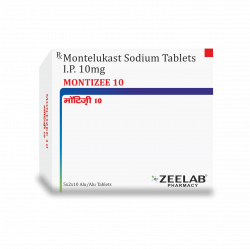Montelukast
Introduction
Montelukast is a prescription medication commonly used to prevent and manage asthma symptoms and seasonal allergies. It belongs to a class of drugs known as leukotriene receptor antagonists. By blocking substances called leukotrienes, Montelukast helps reduce inflammation in the airways, improving breathing and preventing asthma attacks. It is an effective and well-tolerated treatment for both adults and children, making it a popular choice for managing respiratory conditions.
Uses of Montelukast
- Prevention and treatment of asthma in children and adults.
- Relieves symptoms of hay fever and seasonal allergies, such as sneezing, runny nose, and itchy eyes.
- Reduces the frequency and severity of asthma attacks.
- Prevents exercise-induced bronchoconstriction (difficulty breathing during exercise).
How Montelukast Works
Montelukast works by blocking leukotrienes, which are chemicals in the body that cause inflammation, bronchoconstriction, and mucus production in the airways. By preventing these actions, Montelukast helps to open the airways, reduce swelling, and improve overall breathing, making it easier for patients to manage asthma and allergy symptoms.
Benefits of Montelukast
- Helps control asthma symptoms and reduces the need for rescue inhalers.
- Relieves allergy-related symptoms such as sneezing, congestion, and itching.
- Reduces the frequency of asthma attacks and improves lung function.
- Effective in preventing exercise-induced breathing difficulties.
How to Take Montelukast
Montelukast is typically taken once a day, in the evening, with or without food. The recommended dosage depends on the age of the patient and the specific condition being treated. Always follow your doctor’s instructions for proper dosage. For children, Montelukast may be available in chewable tablets or granules, while adults generally take it in tablet form.
Side Effects of Montelukast
- Common side effects include headache, stomach pain, and dizziness.
- Less common side effects may include mood changes, sleep disturbances, and joint pain.
- Severe allergic reactions, including swelling of the face or lips, are rare but may occur.
Safety Advice
- Consult your doctor before using Montelukast if you are pregnant, breastfeeding, or planning to become pregnant.
- Montelukast should not be used to treat acute asthma attacks. Always have a rescue inhaler on hand for emergencies.
- Tell your doctor if you have liver problems, a history of mental health issues, or are taking any other medications.
- Keep your doctor informed about any new symptoms or side effects while taking Montelukast.
Frequently Asked Questions (FAQs)
Q: What is Montelukast used for?
A: Montelukast is used to treat asthma and allergies, including seasonal allergies and exercise-induced bronchoconstriction. It helps prevent asthma attacks and alleviate allergy symptoms.
Q: How long does it take for Montelukast to work?
A: Montelukast can take a few days to show improvement in allergy symptoms. For asthma control, it may take a few weeks of consistent use to experience full benefits.
Q: Can Montelukast be taken for chronic allergies?
A: Yes, Montelukast is effective for long-term management of allergic rhinitis, reducing symptoms like sneezing, nasal congestion, and itchy eyes.
Q: Are there any side effects of Montelukast?
A: Common side effects include headache, stomach pain, and dizziness. Serious side effects are rare but can include mood changes or allergic reactions. Contact your doctor if you experience any concerning symptoms.
Q: Can I stop taking Montelukast once my symptoms improve?
A: No, it is important to continue taking Montelukast as prescribed to maintain asthma and allergy control. Always consult your doctor before stopping any medication.
Download India's most affordable pharmacy app
- Compare with medicine prices
- Save upto 90% on your medicine bills

Temperature Controlled storage and delivery

Regular Sanitization

Disinfected Packaging















 Added!
Added!